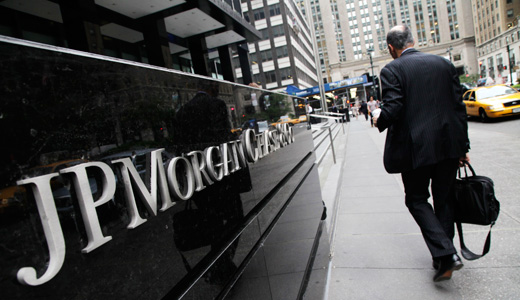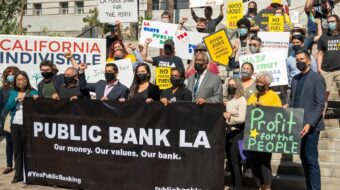
Shafting your workers, hurting your customers, destroying the land and leaving the public to pick up the tab aren’t anomalies, wrote William Deresiewicz in the New York Times May 12. “This is how the (capitalist) system works: you get away with what you can and try to weasel out when you get caught.”
His assessment, unfortunately, explains the current debacle at JPMorgan Chase better than the assessments offered up by representatives of most of the major media, with a few exceptions.
Responding to the announcement by Chase last week that it had lost $2 billion on a bad trade, the Huffington Post’s Mark Gongloff said: “Multiply that by 10, and you’re starting to get a better idea of how much it really lost.”
You get the better picture when you consider that the share price of Chase tumbled by almost 13 percent since it announced the “trading” loss, cutting at least $18 billion from its market value.
The Wall Street Journal, the New York Times, MSNBC’s Joe Scarborough and a legion of other journalists tell us there’s not much to worry about because two billion (sic) is only a small part of the $90 billion that Chase has taken in over the last year.
“There were many errors, sloppiness and bad judgment,” Chase CEO Jamie Dimon said on a conference call with the press last Friday.
What he did not say was that Chase spent $10 million lobbying this year to weaken regulations that would have prevented the $20 billion debacle. The loss underlines the need, of course, for stronger financial regulations
A Reuters investigation last week showed that HSBC, the world’s fifth largest bank, failed to review thousands of internal anti-money laundering alerts. The bank did not file legally required “suspicious activity reports” to U.S. law enforcement officials.
Last month regulators accused Citicorp of having major lapses in its anti-money laundering systems as well but the bank ended up paying no penalty or admitting any wrongdoing.
A Nigerian governor pleaded guilty in a British court last month to pilfering $79 million from public coffers in his country and using major banks, including HSBC, Citibank, Barklay’s and Schroders to move the money.
“Banks get hauled up by the regulators for failing to follow the law, promise to reform, and then down the line are caught doing the same thing again,” Robert Palmer of the anti corruption group Global Witness told Atlantic Monthly last week.
Chase and others continue their policy of high stakes gambling rather than investing in the nation’s communities because they are certain the public will always be there to bail them out when and if they place losing bets.
“Markets have come to believe that what the government did in 2008 and 2009 isn’t a one-time deal,” Kevin Warsh, a former member of the Federal Reserve Bank Board of Governors, said in a March television interview.
The story about Chase is much more than just the story a deal that went “bad.”
It is the story about a mega-bank, about all the mega-banks really, systematically engaging in criminal activity for many years.
It is the story of how the big banks regularly use their vast riches to buy off and corrupt lawmakers and regulatory systems.
It is the story of how these institutions are regularly assisted, knowingly or unknowingly, by members of the media lacking either the knowledge or the will to tell the public what is really happening..
It is the story about how the mega banks pay out billions to “settle” out of court and out of view of any regulators charges against them that include bank fraud, home foreclosure fraud, perjury, sale of unregistered and illegal instruments and a host of other crimes.
It is the story of how a banking billionaire, after doing all of this, can go on national TV to promote Simpson-Bowles, an austerity plan for the majority, and to push privatization of Social Security.
The real purpose of “austerity” moves is to force the sale of ports, airports, railroads, highways and other public properties. Turn over everything, including government itself, to private corporations.
Privatization of social security would turn over to corporate control the biggest pot of money they ever got control of in one big move. Imagine the gambling the banks could do with that!
There are a number of immediate reasonable solutions including tighter banking regulations, stronger rules guaranteeing permanent separation of investment and commercial banking and forcing Dimon to step down. While all of these measures are steps in the right direction solutions that go deeper are needed.
First, banks like Chase are so big that failure would once again necessitate bailout by the public. Breaking up the mega banks so that failure of one bank would not topple the entire economy is another step in the right direction.
For the long term, however, rather than have banks or other private corporations taking over the public arena, why not have the public take over the banks? Spain is now in the process of putting one of its large banks under public control, rather than bailing it out. In any case, only when the banks see that we are serious about putting an end to their free reign will they even try to shape up. Public takeover of the banks amounts to the people acting to guarantee that the market to responds to human needs, not just to a CEO’s desire for profits. It’s ultimately the only way we can rescue the banks from the control of the greedy profiteers and put them to work meeting the needs of the 99 percent.
Photo: At a JPMorgan Chase office building in New York City, May 14. JPMorgan, the largest bank in the United States, is seeking to minimize the damage caused by a $2 billion trading loss, disclosed by CEO Jamie Dimon. Mark Lennihan/AP












Comments